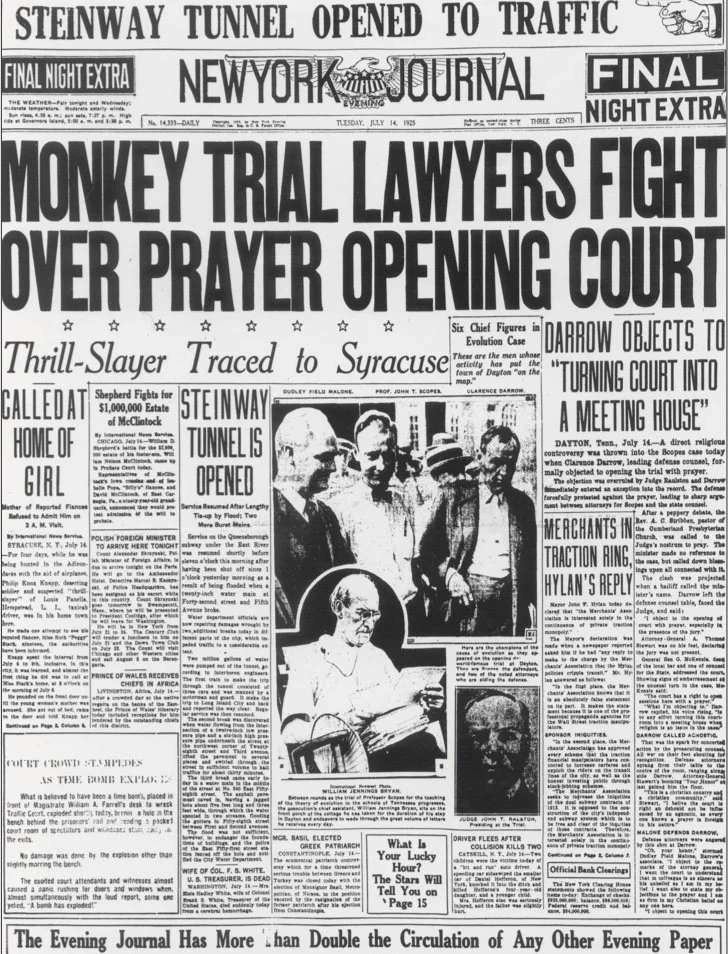On this day: 10th July 1925 - The Scopes ‘Monkey Trial’ Begins
An article from the New York Journal exhibits just how divisive the case was along ideological lines. (Courtesy of New York Journal)
One hundred years ago, a 24-year-old biology teacher in Dayton, Tennessee, walked into a courtroom; and at the same time, into the history books. His name was John T. Scopes. His crime was teaching a controversial topic found in the very textbook his state government had approved: Darwin's Theory of Evolution. The date was July 10th 1925. However, if you squint really hard, you might just think it’s the present day. As we revisit this story, we get a glimpse of a drama that in many ways has never quite left the classroom.
Even though The Scopes ‘Monkey Trial’ is often remembered for its cast of characters and media spectacle, beneath the theatrics lies an uneasy constant still true today. The classroom setting is never just a neutral place for instruction. Classrooms are settings where knowledge, ideology, and culture collide, and sometimes with explosive social consequences. Understanding the boundaries of what may be known, and what may be said are not fixed in academic wisdom. They are swayed by political currents and social unease. Although the objectives of what society wants to teach its young shifts over generations. A century on, it is clear, that this enduring feature of public education remains lurking.
The headquarters of prominent Mississippi-based Christian evangelist, T.T. Martin.
A Trial That Prophesised the Present
There is something uncanny about the way the history surrounding John Scope’s trial echoes in the current era. Then, as now, lawmakers tried to sanitise what could be taught. In much the same way teachers steer somewhat precariously between professional integrity and political constraint.
In 1925, The Butler Act, which criminalised the teaching of evolution, sat counterintuitively alongside a textbook that included it. As an unsuspecting victim of history, John T. Scopes wasn’t defying policy, he was enacting its contradiction.
A century later, educators across various regions again find themselves working under competing commands. In the U.S. recent attempts by the Trump administration to ban the teaching of race, gender, or historical injustice, and assert a top-down control of historical narratives has directly aimed to reshape education. Closer to home, in the U.K. political interventions into curriculum content deemed loosely defined ‘anti-capitalist’ material as extremism. Whilst being encouraged to engage in discursive thought and critical thinking, teachers are being threatened to limit this. In 2025, the classroom remains an environment where competing narratives meet.
The Law on the Whiteboard
Reviewing the archives, one of the curious characteristics of the Scopes case is just how little the story focused on Scopes himself. He became more of a proxy in a wider battle. The more enduring figure on trial was the teacher’s role within democracy. What degree of independence should they have? At what point does guidance become a restriction?
These are not abstract questions. When law defines what must and must not be taught, education edges toward hardline indoctrination. Furthermore, when legal obligations conflict with professional standards, the teacher is left to find their own path in the ambiguity. Even at their own personal risk.
The tense scenes from inside the courtroom.
Why is This Case Still Important for Educators?
A century ago, Scopes was backed by civil rights advocates and a community willing to resist the courts. However today, many teachers face mounting pressures with far less institutional support. Curricular guidance is increasingly standardised and professional judgement is second-guessed. The figure of the teacher as someone who is a reflective practitioner has given way to a facilitator; someone who is ideologically neutral, mechanically efficient and mostly silent when navigating complex issues.
The idea of the teacher as a trusted intellectual, to a certain extent, has been curtailed over time. In place of this role exists a more functionary actor: someone who delivers pre-cleared content and stays within the lines. For teachers the stakes are not just professional; they are also philosophical. If teachers cannot guide inquiry, then education becomes more of a performance than a process.
Conflict is the Point of Education
To wish for education which is free from controversy misunderstands what it functions for. Schools have always been a forum in which society makes sense of their values. This still remains the case.
Curricular reforms and textbook disputes reflect a deep tussle over national cultural identity. This friction alone is not symptomatic of a dysfunctional society, it is a sign of a democratic system doing what it must in order to find its soul. However, the exploitation of power to suppress this debate is the real looming threat.
Sentiments on both side of the debate we verciferous.
The centenary of the Scopes Trial gives a valuable moment for reflection. We must ask ourselves what kind of education we want, and whether we are prepared to defend it. It reminds us that when educators are prosecuted for telling the truth, democracy is the one on trial.
Do we want a society trained to ask questions, or conditioned to repeat answers? Do we believe that discomfort is a threat, or a teacher?
The Scopes Trial predicted the future with unsettling accuracy. It showed how ideology masquerades as law, and how quickly classrooms become theatres for struggle.
It is tempting to memorialise John Scopes as a hero. But the more valuable tribute to make may be to ensure the vigilance of society. In a society where polarisation and intolerance is growing, a drama is unfolding once more; though one wonders if we are watching closely enough.
Further reading
https://apnews.com/article/scopes-monkey-trial-tennessee-evolution-creationism-1db282339a6f5a6b6d4a8b52dfdf45f3
Wineapple, B. (2024) Keeping the Faith: God, Democracy, and the Trial That Riveted a Nation. New York: Random House.





